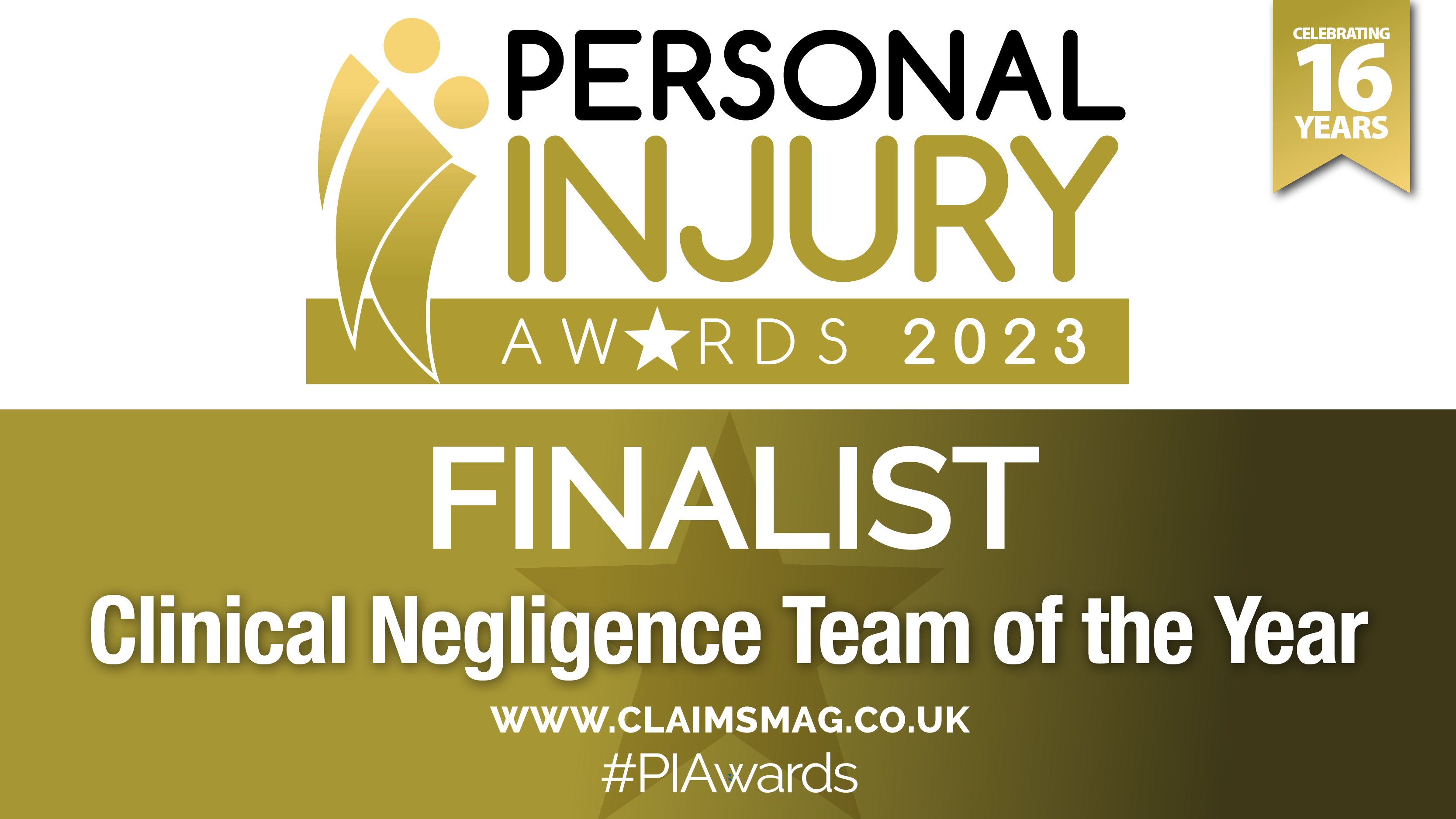Personal
Medical Negligence Compensation Guide
SOLVING PERSONAL LEGAL MATTERS

Medical negligence can be a complex area of law. This guide aims to explain what is classed as medical negligence, what to do if you think that you might have experienced this and to answer questions that you might have about potentially making a compensation claim for medical negligence.
What is Medical Negligence?
Medical negligence, which is also sometimes called clinical negligence or medical malpractice, occurs when the standard of care you are given by a medical professional falls below acceptable standards and you are injured, or your existing condition becomes worse, as a result.
Examples of what qualifies as medical negligence could be a wide range of issues, including, but not limited to:
- A delayed diagnosis
- A misdiagnosis of your condition
- Injuries causes by errors or mistakes by medical professionals
- Injuries caused by medical professionals not following proper procedures
- Failure to get the proper patient consent for treatment
- Failure to explain the potential risks of treatment
- Administration of the incorrect medication.
Examples of medical negligence can also include injuries caused to a baby or their mother during pregnancy or the child's birth, dental negligence, GP or doctor negligence or any mistakes made by a medical professional which means your treatment was not up to standard and you have suffered as a direct result of this.
Who can make medical negligence claims?
If you are over the age of 18, and have experienced medical negligence, you can make a claim for compensation yourself, if you are able.
For children who have been injured or suffered due to medical negligence, their parent or guardian can make a claim on their behalf, or the child can do so themselves once they reach the age of 18.
If the medical negligence caused someone's death, members of their family can make a claim on behalf of the deceased.
If someone does not have the physical or mental capability to make a medical negligence claim themselves, a family member or loved can make the claim on their behalf instead.
How much medical negligence compensation can I claim?
The amount of medical negligence compensation that you can include in your claim will depend on the circumstances involved in your specific case. As well as compensation for the injury caused and the impact that this has had on your life, you may also be able to claim back any out of pocket expenses that you have paid out due to the injury, such as medical and transport costs. In addition to this, if the medical negligence means that you will need to make alterations to your home or vehicle, has affected your ability to work, or has left you with future or long term care needs that require funding, the claim can also include the costs of this now and in the future.
Because every case is different, there are no hard and fast medical negligence compensation guidelines about the amount that will be awarded if the claim is successful. This can also vary, depending on whether the case is settled out of court (as the vast majority are) or whether a judge needs to decide on the compensation amount.
To find out more about how much you might be able to claim, you can contact us for free initial advice where we can give you an estimate of the amount you could be awarded if the claim is successful. We can estimate this based on medical negligence compensation examples from other successful claims we have worked on and our team's experience in this field.
What proof is needed in medical negligence cases?
If you want to make a claim for medical negligence, UK law requires that you must be able to prove that the negligence act or acts have directly harmed you or made your existing condition worse and thus has caused you to suffer unnecessarily.
The types of evidence required to prove clinical negligence compensation claims will usually include:
- Your medical records
- Photographs or video footage of injuries caused by the medical negligence
- A statement from you about what happened
- Witness statements from family or friends if required.
- Documents to prove any losses and expenses
Medical negligence compensation claims usually require an independent medical expert to confirm your treatment was negligent and whether it directly caused your injury or made your existing condition worse. You may also need to be assessed to determine how long your recovery is expected to take and to review your long-term prognosis.
Will I need to go to court if I make a medical negligence claim?
The majority of medical negligence claims are settled without needing to go to court. It is often only the most complex of medical negligence claims that require a court judgement to determine the outcome. If your case does require a court appearance, we will be with you at every stage to help you with the process and provide all the support you need with your claim.
Is there a time limit for medical negligence claims in the UK?
In most cases, there is a time limit of three years to make a claim for medical negligence. The clock starts at the point that you are deemed to become aware of the medical negligence, which might potentially be some time after the negligent treatment actually took place.
There are some exceptions to the three-year time limit. You can find out more about the time limit for medical negligence claims and the exceptions here.
Should I sue the NHS for negligence?
If you have experienced medical negligence whilst being treated under the NHS, you might be worried about seeking medical compensation from this public and much-loved institution. However, if you have suffered as a result of the negligence of an NHS medical professional, making a claim can help ensure that the same thing doesn't happen to someone else.
NHS negligence claims are designed to help put you back into the position that you would have been in, if the negligence hadn't have happened in the first place, rather than being about you benefitting financially. Being left with a long-term problem, unable to work or enjoy the things you used to, worse still, needing full time care can have a devastating effect on your quality of life and that of your family. By making a claim, the compensation can help to restore that loss and enable you to fund the help and support required.
How long does the medical negligence claim process take?
The amount of time that a medical negligence claim takes can vary quite widely, depending on the complexity of the case and how easily the required evidence can be gathered, as well as the response or defence from the other party involved. The process can sometimes be completed within a few months, usually for very straightforward claims where the other party accepts liability for what happened and offers a settlement. On the other hand, more complex cases can take significantly longer to resolve.
We always aim to settle medical negligence claims as quickly as possible, without compromising on the level of compensation that you deserve for what has happened to you.
How to fund a medical negligence compensation claim
There are usually several different ways in which a medical negligence claim can be funded, and Forbes will always discuss the options with you to find the one that works best for all involved. Providing the claim has reasonable prospects of success we will take the case on a no win, no fee basis (known as a Conditional Fee Agreement or CFA) which means that you don't pay a penny if your claim isn't successful. Find out more about no win, no fee medical negligence claims here.
Other funding options include legal aid (available for birth brain injury claims) or privately funding the claim. Get in touch to find the best funding solution for your claim.
Do I need medical negligence solicitors to make a compensation claim?
To make a successful claim for medical negligence and find a measure of justice for what has happened to you, an experienced solicitor in medical negligence compensation claims will be able to offer the very best advice and support to help you at every stage of the process.
Your solicitor will be able to access your medical records and help gather the evidence needed to prove that the medical negligence occurred and how it has affected your life as a result.
Forbes have a proven track record in achieving successful outcomes for medical negligence claims and our team have Law Society specialist panel status and many years of experience in this area of law.
Get in touch with us for a free claim consultation to see if you are eligible to make a medical negligence compensation claim.
Contact Us
Get in touch to see how our experts could help you.
Contacting Us
Monday to Friday:
09:00 to 17:00
Saturday and Sunday:
Closed
Our dedicated Clinical Negligence team

Contact Us
If you have a general enquiry then please fill in your details and someone will contact you.
Contacting Us
Monday to Friday: 09:00 to 17:00
Saturday and Sunday: Closed













